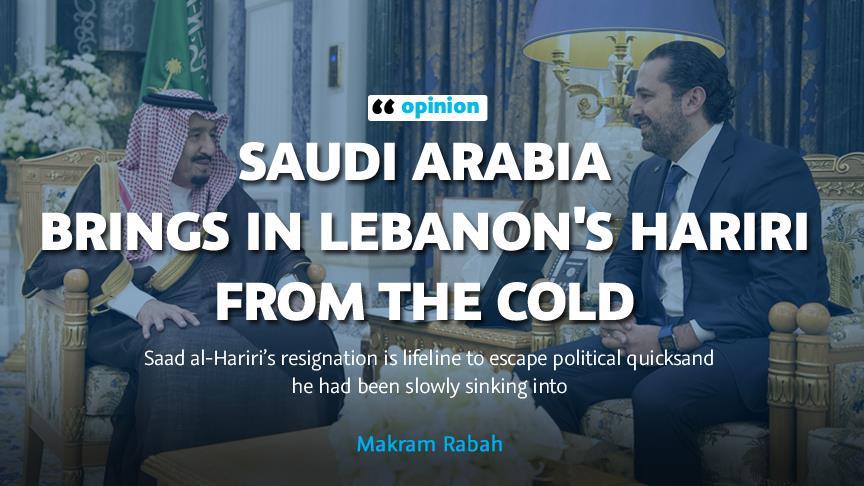OPINION - Saudi Arabia brings in Lebanon's Hariri from the cold
Saad al-Hariri’s resignation is lifeline to escape political quicksand he had been slowly sinking into

By Makram Rabah

BEIRUT
The Lebanese tranquil autumn weekend came to an abrupt pause as news broke out of the resignation of Prime Minister Saad al-Hariri, who surprised everyone, including his closest
While perhaps sudden both in its timing as well as its staging, Hariri’s resignation was quite inevitable given the sequence of regional events and the continued Iranian-Saudi tensions, which positioned Hariri between the Saudi anvil and Hezbollah’s hammer.
Practically, this resignation has put an end to an anomalous transaction that had brought on Michael Aoun -- an ally of Iran and Syria -- as president, and in exchange, Hariri had received unanimous approval to form a national unity government. This then ended a period of political deadlock that had started with the end of former President Michael Suleiman’s tenure.
Many who opposed this Faustian settlement at that time viewed it as largely in
By including Hezbollah in his Cabinet, Hariri was effectively providing cover to an organization that was implicated in the killing of his father, the former Premier Rafik Hariri, and that was also accused of engendering regional instability.
Guilelessly believing that opening up to Iran’s Lebanese proxy Hezbollah would curb its involvement in the region, Hariri soon found himself playing second fiddle to Aoun and his son-in-law, Lebanese Foreign Minister Gebran Bassil, who vigilantly
Despite this fact, Hariri refrained from questioning the intentions of his new-found allies and instead preferred to adopt an ostrich-like tactic, choosing to ignore these drastic differences and instead focused on economic and development projects.
A year into Hariri’s continued collaboration with Aoun and his lingering tepidness in opposing Hezbollah, Saudi Arabia, with Crown Prince Mohammed bin Salman now at the helm, decided that this “incestuous affair” must come to an end.
Consequently, the crown prince dispatched Thamer Al-Sabhan, the Saudi minister of state for the Gulf region, who surveyed the local political landscape before shooting off a series of aggressive tweets in which he attacked Hezbollah and warned the Lebanese of the consequences of allowing Hezbollah to use the Lebanese government as a platform to pursue its goals.
Saudi Arabia’s somewhat crude warnings came as a stark reminder to friends before foes that they would no longer permit moral and physical transgressions, be it through the invasive speeches of Hezbollah Secretary General Hassan Nasrallah or by training and fighting with the Houthis in Yemen.
Above all,
While many are still pondering the real motives for Hariri’s his sudden resignation, going as far as to believe that Hariri was forced at gunpoint to read a prepared statement, the reality resides in the obvious.
One day before sending his resignation, Hariri received Ali Akbar Velayati, senior adviser to Iran's supreme leader, who was visiting Beirut to speak at the International Conference of Resistance Scholars.
This conference is one of the many outlets Iran uses to disseminate its anti-Saudi and anti-western rhetoric.
Upon exiting his meeting, Velayati reminded Hariri that “Iran protects the stability of Lebanon and its government and welcomes its independence”.
This seemingly ordinary declaration was the coup de grace, which ushered the final act in a play that Hariri got caught up in as both a victim and a dramatic hero.
Consequently, during his three-hour flight to Riyadh, Hariri might have realized that he got more than he had bargained for when he took Aoun as an ally, and more importantly, that the entire year spent avoiding thorny issues and underscoring national unity was a farce exploited by Iran to its advantage.
Subsequently, Hariri’s resignation is a lifeline to escape the political quicksand he had been slowly sinking into, one which, with the passage of time, made him more of a collaborator of Iran rather than a trusted Saudi ally.
Be that as it may, anyone who so wishes may discard the aforementioned events and adopt the conspiracy theory scenario, in which Hariri’s resignation is seen merely as an act of bullying by a disgruntled Saudi establishment. However, these people would be missing an important chapter in a much longer narrative that the next few months will reveal.
*Opinions expressed in this article are the author’s own and do not necessarily reflect the editorial policy of Anadolu Agency. Anadolu Agency website contains only a portion of the news stories offered to subscribers in the AA News Broadcasting System (HAS), and in summarized form. Please contact us for subscription options.







